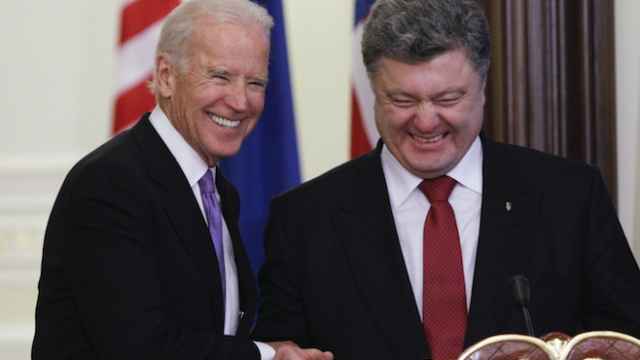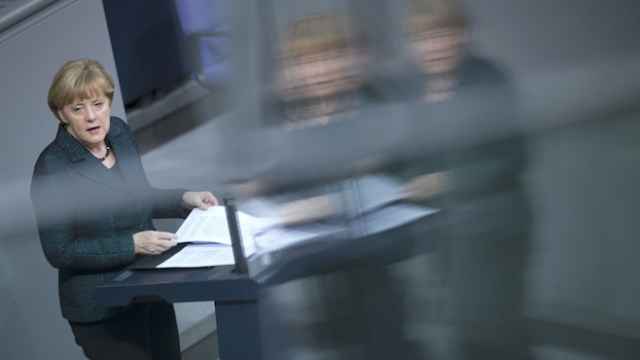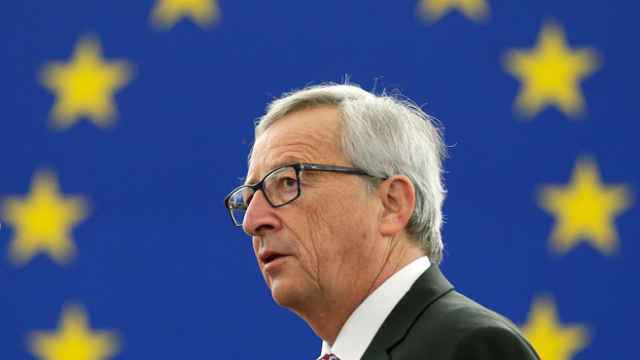BRUSSELS — U.S. Secretary of State John Kerry will talk to European allies this week about imposing further sanctions on Russia if pro-Moscow separatists in Ukraine do not halt the violence, a senior U.S. State Department official said Tuesday.
The U.S. and the 28-nation European Union have both imposed sanctions on Russia's financial, defense and energy sectors over Moscow's annexation of Crimea and its support for the separatists in eastern Ukraine.
"There are continuing conversations with the EU about continuing to expand sanctions," said a senior U.S. State Department official accompanying Kerry to a meeting of NATO foreign ministers in Brussels on Tuesday.
"We will be having those conversations about where we go next, particularly in response to the continued supply of heavy weapons coming across the border [from Russia]," said the official, briefing reporters on condition of anonymity.
But EU diplomats say there is little appetite within the bloc for more sanctions unless there is a further sharp deterioration of the situation in Ukraine. Russia is Europe's leading energy supplier and many EU countries fear the sanctions and Russian reprisals could hurt their own economies.
"Our role is also to explore ways for dialogue [with Russia]," the EU's foreign policy chief Federica Mogherini told reporters at NATO when asked about possible new sanctions.
Mogherini noted that the EU had just imposed sanctions on more separatists. The new head of the European Commission, Jean-Claude Juncker, has said he does not see the point of constantly threatening more measures.
The U.S. official said Washington was willing to roll back sanctions if Russia met its commitments under the Minsk cease-fire accords.
A combination of the sanctions, low oil prices and general mismanagement are having "an intense effect" on Russia's economy," the official added.
"You can see it in the billions that they have had to spend defending a ruble that continues to fall. You see it in the high rates of inflation inside the country."
The official said a number of allies had joined the U.S. in providing "relatively high-end nonlethal supplies to Ukraine" and some others were expected to make new offers at the NATO meeting.
On Tuesday, Ukraine's military and separatist forces agreed "in principle" on a new cease-fire from Dec. 5 in the rebel-held Luhansk region, the OSCE security group said.
The original cease-fire in eastern Ukraine, agreed in Minsk on Sept. 5, has been regularly violated.
//BLOB// On Monday, a State Department spokesperson said the U.S. would act if Russia concludes any economic deal with Iran that flies in the face of international sanctions against Tehran.
"We are aware of the talks between Russia and Iran involving various areas of planned future economic cooperation," spokesperson Jen Psaki told journalists at a press briefing.
A day earlier, Russia's Economy Minister Alexei Ulyukayev said he hoped a deal to supply grain and equipment to Iran in return for oil could be reached soon, Reuters reported.
Asked about the oil-for-grain deal, Psaki said the U.S. would act if it was sanctionable, according to a transcript on the U.S. State Department website.
Russia and Iran have forged closer ties this year, with both countries facing increasing isolation from the West. While Moscow has been targeted by U.S. and EU sanctions over its policy on Ukraine, Iran has faced United Nations sanctions over its uranium-enrichment program since 2006. (Reuters, MT)
A Message from The Moscow Times:
Dear readers,
We are facing unprecedented challenges. Russia's Prosecutor General's Office has designated The Moscow Times as an "undesirable" organization, criminalizing our work and putting our staff at risk of prosecution. This follows our earlier unjust labeling as a "foreign agent."
These actions are direct attempts to silence independent journalism in Russia. The authorities claim our work "discredits the decisions of the Russian leadership." We see things differently: we strive to provide accurate, unbiased reporting on Russia.
We, the journalists of The Moscow Times, refuse to be silenced. But to continue our work, we need your help.
Your support, no matter how small, makes a world of difference. If you can, please support us monthly starting from just $2. It's quick to set up, and every contribution makes a significant impact.
By supporting The Moscow Times, you're defending open, independent journalism in the face of repression. Thank you for standing with us.
Remind me later.





